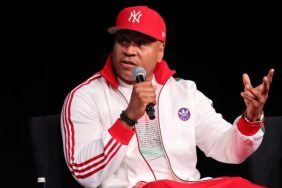Ever since Remy Ma released “ShETHER” last week, Hip-Hop fans everywhere have gotten a taste for beef. One rap’s oldest forms, the battle raps is a fight to the finish where only the strongest survive. It’s long been a staple for the MC, who started taking out all comers to earn street cred and notoriety. Before anyone was laying down tracks on wax, MCs earned their stripes on stage in front of a live audience.
Also: “Hip-Hop Evolution” Is One for the History Books
Then the game changed and artists started getting record deals. Their rhymes were preserved and distributed to the public at large. Battling took Hip Hop to new heights as the answer record, as it was called then, kept fans hype. By the mid-80s, it was a regular trend, with answer records flying back and forth. It was always personal, putting the dozens to a beat, turning the dozens into a musical art.
It wasn’t political—until Boogie Down Productions (BDP) arrived on the scene, changing the rap game forever with the March 3, 1987, release of Criminal Minded, their debut album. Comprised of KRS-One, Scott La Rock, and Ced-Gee, BDP came out with both barrel blazing, firing off rounds at Queens natives MC Shan and the Juice Crew with “South Bronx” and “The Bridge is Over.”

KRS-One spoke with Brian Coleman about the inspiration for “South Bronx” for the book Check the Technique: Liner Notes for Hip-Hop Junkies. He remembers, “There was an engineer named Frankie D who worked at Power Play Studios in Queens…..Frankie liked our stuff and wanted us to meet with Mr. Magic [the top Hip-Hop radio DJ in New York]….Frankie D must have played him something when we were gone and he came back and said: ‘I played it for Mr. Magic and he said it was wack.’ We we was like: ‘What? Are you crazy? MC Shan is wack, not me.’ And I went home and wrote ‘South Bronx.’”
“South Bronx” was a tribute to the earliest days of Hip Hop, when DJs sparked a revolution by spinning just the breaks so the b-boys and b-girls to dance to the best part of the records. On the track, KRS laid it down, name-checking Coke LaRock, Kool Herc, and Afrika Bambaataa, the first DJs in the game, . The song was a history lesson for a culture just 13 years old, setting the record straight once and for all.
In Check the Technique, KRS reveals that Scott La-Rock used that record to mastermind a strategy that capitalized on the answer record trend. He recalls, “Scott was such an entrepreneur that his whole plan was to go to Mr. Magic and say: ‘OK, we’ll do a track dissing you and then Shan can come out and dis us.[ Back then the answer records were real big, with Shante and UTFO and Spyder-D and Sparky-D. We went to them [Juice Crew DJ/producer Marley Marl and Mr. Magic] because they was the kings of the battle record. But Marley was the one Scott met with and Marley basically said: ‘We don’t need you, we’re the Juice Crew.’ So we pressed the song up and put it out on B-Boy.”
KRS gave the song to DJ Red Alert, a radio DJ who was in direct competition with Mr. Magic, who was mentioned on the track. Red dropped the song at the Latin Quarter, the hottest Hip Hop club at the time, and the rest was history. The song made it to the radio, and MC Shan came back with “Kill That Noise,” his answer record.
https://www.youtube.com/watch?v=8csxCThXRII
One week later, BDP responded with “The Bridge Is Over,” one of the illest takedowns in the history of Hip Hop. Lyric after lyric, he fired shots at every member of the Juice Crew, and decimated the borough of Queens. KRS told Coleman he did the song in just one take. MC Shan never responded—neither did Marley Marl nor Mr. Magic.
With this groundwork in place, BDP put together tracks for Criminal Minded, including classic joints “Poetry,” “9mm Goes Bang,” Remix for P is Free,” “Super-Hoe,” and “Elementary.” The songs talked about what was going on at the time—the sweeping crack epidemic that saw a generation disappearing in record time. But it wasn’t just the ill lyricism of KRS-One that made the album a hit, but the brilliant production and samples from artists as diverse as AC/DC, The Beatles, Bill Joel, First Choice, Yellowman, Super Cat, and James Brown.
Upon its release, Criminal Minded was a hit. Though its peak position on the Billboard R&B chart was only 73, it became an instant classic, which has been sampled by everyone from Michael Jackson to Killer Mike, and has appeared on countless great hits lists from everyone from Vibe to Rolling Stone.
https://www.youtube.com/watch?v=3HwWwVT3B5U
The album cover was also notable for its imagery, which shows KRS-One and Scott La Rock surrounded by weaponry. KRS told Coleman, “We wanted the most shocking album cover that we could find, and that was what it ended up being. We wanted to set a precedent that we was real, this is real, this is where hip-hop is going. From fantasy to reality. And that’s exactly what happened. I wouldn’t say that we were the only ones, because Eric B & Rakim’s Paid In Full assisted that image as well, and Schoolly D was out of control, with ‘P.S.K.’….We were all part of the same movement that wanted to show the street mentality.”
But the fantasy to reality got all too real when Scott La Rock was killed on August 26, 1987, less than six months after Criminal Minded was released. D-Nice, a member of their crew, called Scott to let him his life was being threatened. Scott went out to try to negotiate peace, was ambushed, and died from a bullet wound to the head.
The news made headlines in a city that was overrun by violence and death. While the Hip Hop community mourned its fallen soldier, the mainstream media looked to place blame. KRS remembers, “The city was in an uproar, it was all on the news. I remember Connie Chung, she came and said [imitates uptight female voice]: ‘Don’t you think that your album cover incites violence?’ And I was like: ‘No, this is how people are livin’ every day. Does John Wayne incite violence?’”
But KRS didn’t brush it off. Instead he let it sink in, and came back with By All Means Necessary, BDP’s second album, in 1988, taking on an increasingly socially conscious approach to Hip Hop. But Criminal Minded wasn’t irresponsible: it was an effort to tell it like it was during one of the most brutal eras in recent history.
KRS concludes, “When I look back on Criminal Minded now, first of all I’m very proud of it. It’s probably one of the only records I’ll ever be remembered for. But if you don’t know KRS-One, that was the beginning of what’s now called gangsta rap. It wasn’t gangsta rap then, it was basically telling the reality of the street. That’s all it was supposed to be. We wanted to pose with guns because that was the reality of the streets at the time. If the reality of the streets at the time was the Mr. Softee ice cream truck, we’d have posed in front of that. We was trying to tell our story, and the mainstream didn’t hear you unless you were shocking. So if there’s anything to come away from it, I would say that you would have to look at Criminal Minded all the way up to my latest release, Spiritual Minded. To go from being immature to being mature. From boys to men.”
Miss Rosen is a journalist covering art, photography, culture, and books. Her byline has appeared in L’Uomo Vogue, Whitewall, The Undefeated, Dazed Digital, Jocks and Nerds, and L’Oeil de la Photographie. Follow her on Twitter @Miss_Rosen.







